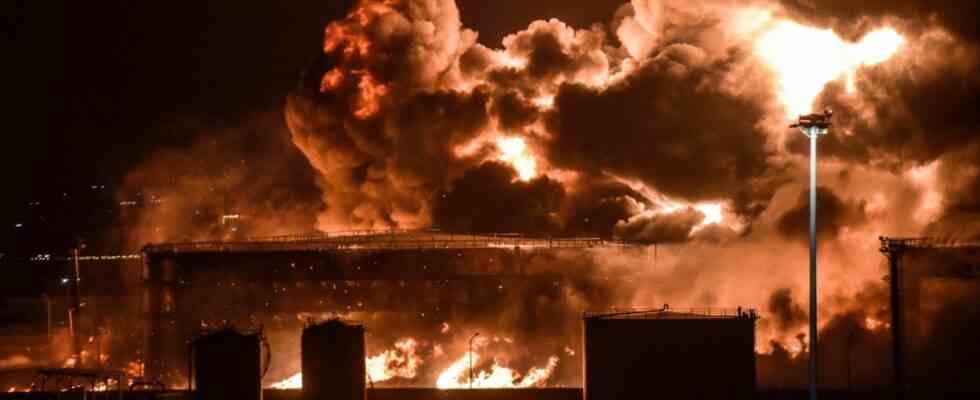Stefano Domenicali, who is something of the modern-day Bernie Ecclestone, has not had an easy job since taking over the helm of Formula One management. But the former Ferrari team boss and Lamborghini CEO has already made the past pandemic racing year a sporting and financial success. And now, with changed regulations and a budget limit, a whole new era in the premier class is about to begin.
It turned out to be a success right away at the start last weekend in Bahrain. In a correspondingly good mood, the Italian traveled the 1,500 kilometers from Manama to Jeddah, where the Saudi Arabian Grand Prix is scheduled for this weekend. The only crisis the 52-year-old could expect was discussing the Netflix epic ‘Drive to survive’. The documentary series has become the global advertising column for F1. However, some drivers, above all world champion Max Verstappen, are increasingly complaining about the imagination of the authors and editors, who would construct conflicts where there were none.
When on Friday afternoon a rocket drone launched by the Yemeni Houthi rebels 20 kilometers from the Jeddah Corniche racetrack crashed into a fuel depot owned by F1 top sponsor Aramco, it was no longer a small crisis, but rather a conflict. At least one of conscience. Suddenly Domenicali himself is in the role of the storyteller: what story does the racing circuit want to tell with its expansion into the Arab states: about a frenzied international understanding? That of absolute profit maximization? Or simply the lap table for the second World Championship round, business as usual?
The attack on the still-burning-out refinery hits F1 in the midst of boom times, when marketers were getting ready to expand the already impressive 23-race program to 30 World Championship rounds per year; to further thin out the appearances in the European heartland – even the classics Monaco, Le Castellet and Spa do not have a valid contract beyond 2022. There would probably be enough applicants for the races, primarily in countries without a great motorsport tradition.
Formula 1 primarily drives in areas without a particular racing tradition
The Middle East has also had the honor of being able to hold five races in a row – with entry fees between 50 and 70 million euros. Per year. No organizer in Germany can keep up with that. The events in Saudi Arabia point to a dangerous triangular relationship between Domenicali and F1 between market value, entertainment value and sporting value. Of course, there would also be some moral values.
With the attack, the Houthi rebels from Yemen are pursuing a goal similar to that of the Saudi government with the guest performance: they want to gain attention and position themselves. According to dpa, F1 is said to be receiving a $900 million signing bonus for ten years. Human Rights Watch sharply criticizes this commitment: “Saudi Arabia has repeatedly used prominent personalities and major international events to distract attention from its widespread human rights violations.”
Lewis Hamilton has positioned himself on the question of what he thinks of racing in difficult regions.
(Photo: Giuseppe Cacace/AP)
Just before the race series arrived, 81 people were executed. Journalists who ask the racing drivers about it in official rounds of interviews usually only get helpless looks in response. Lewis Hamilton, champion of diversity, had already clarified his position last year with a clever rhetorical counter-question to himself: “Do I feel comfortable here?” To then reply: “I wouldn’t say I do it. But it wasn’t my choice to be here. The sport chose it.” Most drivers base their statements on the seven-time world champion.
Most of the drivers apparently did not want to start at first
The attack and the rampant fear in the paddock – the German television broadcaster Sky immediately ordered its reporter team back – cost Domenicali half the night to Saturday. The manager has always been of the opinion that motorsport brings the spotlight to countries like Saudi Arabia and therefore also illuminates the situation in the country and thus promotes change.
After the training sessions on Friday were still reasonably orderly, the teams initially threatened a boycott. When these were pacified, probably with reference to the finances, there were two long meetings with the drivers, most of whom apparently did not want to start at first. Only security guarantees from the Saudi government prevented the threatening cancellation of the second World Cup round.
“It was a difficult day for Formula 1 and a grueling day for us drivers,” said the GPDA pilots’ union. It was difficult to remain fully focused and eliminate all natural human concerns when seeing the smoke from the incident.
Unsurprisingly, the new President of the World Automobile Association presented himself as an advocate for going through with the Grand Prix on the Red Sea, which was held for the first time only five months ago. Mohammed Ben Sulayem from the United Arab Emirates, the first non-European at the top in 117 FIA years, wants to bring motorsport to his home region.
It won’t get any easier after the current events, even if Ferrari team boss Mattia Binotto bravely insists that Formula 1 must send the Saudis “a positive message”. None of his team wanted to leave and it was good for the drivers to be able to speak out.
The underlying resolution “The show must go on” may apply to this weekend. In general, however, the series has to ask itself whether a country that is at war with a neighbor, causing a humanitarian catastrophe there, persecuting government critics or having them killed can be the permanent venue. Even if the dependency is great, Formula 1 must carefully consider whether it can once again risk becoming a target of terrorism. She’s doing no one any favors other than the hosts. It remains a game with fire.

